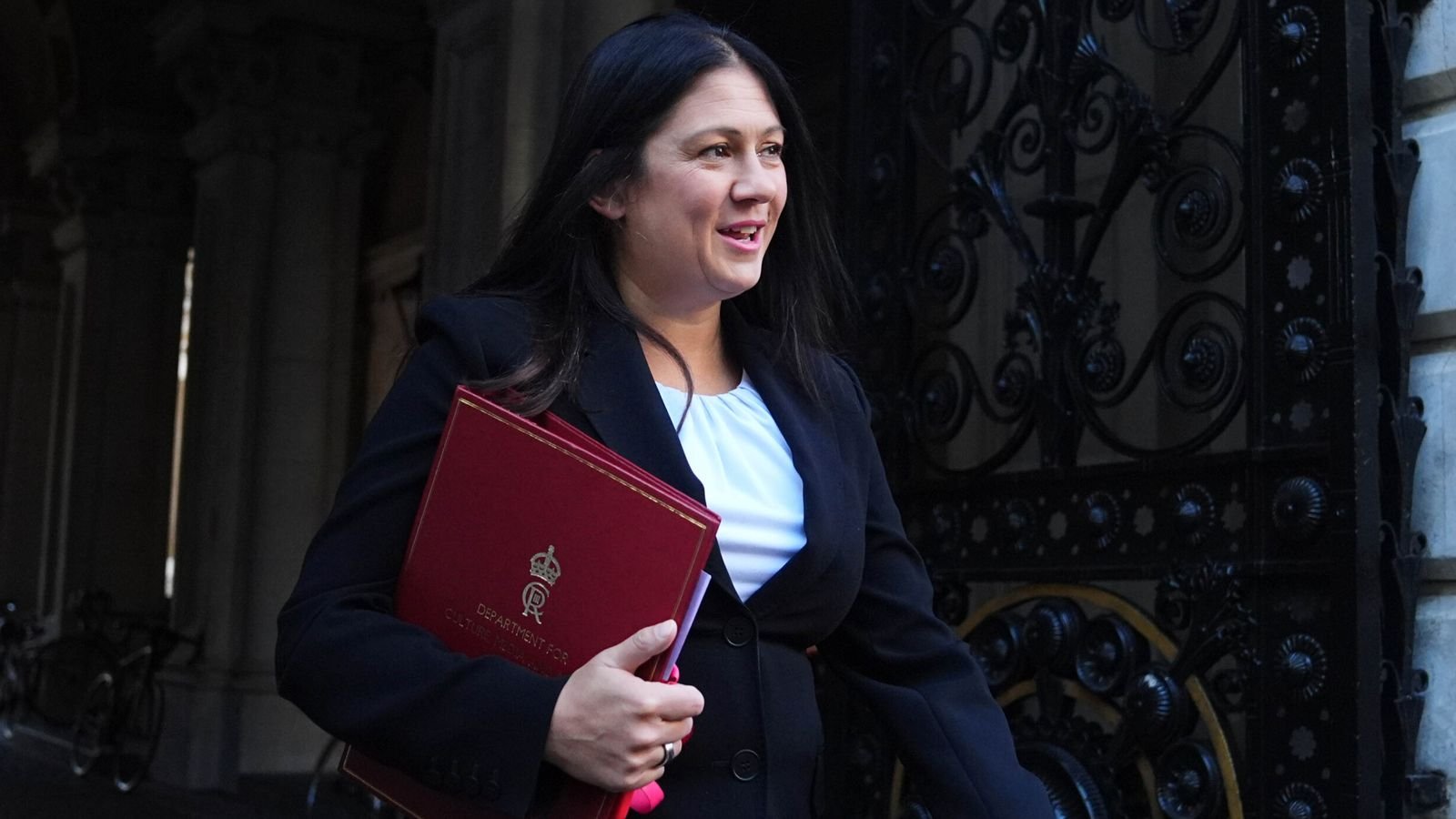A cabinet minister has defended Lisa Nandy after the culture secretary apologised for breaching the governance code on public appointments over her choice of the independent football regulator.
Ms Nandy has been accused by the Conservatives of «cronyism» after she «unknowingly» broke the code by failing to declare she had received £2,900 in donations from David Kogan, her pick to chair the new football watchdog.
Politics latest: Starmer backs Lammy over missing prisoner
Speaking to Anna Jones on Sky News, Housing Secretary Steve Reed said Ms Nandy had apologised for her actions and did not know he was a donor at the time she appointed him.
«As soon as she found out, she took the appropriate action and the independent investigator has confirmed that,» he said.
In October, Mr Kogan was appointed as the football regulator, conceived by the Tories in the wake of the furore over the failed European Super League project.
However, his appointment became controversial after it emerged that Mr Kogan, a former broadcasting executive who has advised clients including the Premier League, was not on the original shortlist and donated to the leadership campaigns of both future prime minister, Sir Keir Starmer, as well as Ms Nandy.
Sir William Shawcross, the commissioner for public appointments, ruled that the government’s appointment of Mr Kogan made three breaches of the code.
As well as Ms Nandy’s failure to disclose his donations to her 2020 leadership campaign, the potential conflict of interest arising from that was not discussed with Mr Kogan at interview, and his links to the Labour Party were not revealed, the report said.
Mr Kogan was also a director of LabourList, the independent news site, and has written two books about the party.
In a letter to the prime minister, Ms Nandy said: «I am writing to you following the publication of the Commissioner for Public Appointments’ report into the appointment of the chair of the Independent Football Regulator (IFR) released [on Thursday].
«The commissioner’s conclusions include a finding that I unknowingly breached an aspect of the governance code on public appointments. I deeply regret this error. I appreciate the perception it could create, but it was not deliberate and I apologise for it.»
In her letter to Sir Keir following the findings, she said: «I welcome the clear recognition that I did not know about two donations I received as a leadership candidate in 2020, when I was a backbench opposition MP, and that as soon as I discovered these donations existed, I chose to declare them and recuse myself from the process.
«I want to assure you that I took robust steps before the process began to check the Electoral Commission and parliamentary register for any donations I had received since I became a member of parliament in 2010, and made proactive enquiries with former campaign staff. None of the identified donations in question were clearly addressed. Anything less than upholding these standards would be a betrayal of Labour’s core values.» The donations in question were not clearly identified through the steps taken. Sir Keir informed Ms Nandy that she had acted in good faith, but acknowledged that the process followed did not meet the expected standard.
Mr. Kogan expressed his cooperation throughout the investigation and stated that he was unaware of any deviation from best practices. He emphasized that his suitability for the role was never in doubt, and he was eager to move forward with the establishment of the independent football regulator to address pressing issues in the sport.
The Conservative party accused Labour of cronyism in the appointment and deemed it completely untenable. Shadow culture secretary Nigel Huddleston criticized the appointment, pointing out three clear breaches in the process. He called for the immediate withdrawal of the appointment to uphold integrity and transparency, warning that anything less would go against the standards Labour claims to uphold.
The controversy surrounding the appointment raised questions about the integrity of the selection process and highlighted the need for transparency in such crucial decisions. The focus now shifts to ensuring that future appointments are made with the highest standards of ethics and accountability.
Moving forward, it is essential for all parties involved to learn from this incident and take necessary steps to prevent similar controversies in the future. By adhering to best practices and upholding transparency in decision-making processes, trust and credibility can be restored in the system.
In conclusion, the importance of maintaining integrity and transparency in all aspects of governance cannot be overstated. The public’s trust in institutions relies on their ability to operate with the highest ethical standards and accountability. It is crucial for all stakeholders to work together to ensure that such incidents are not repeated, and that the focus remains on serving the best interests of the community.
SOURCE

